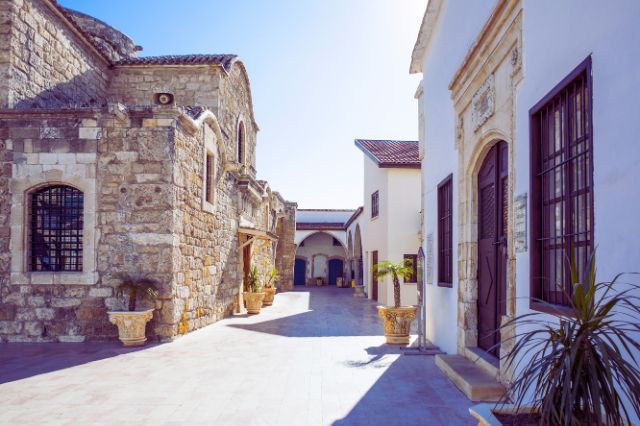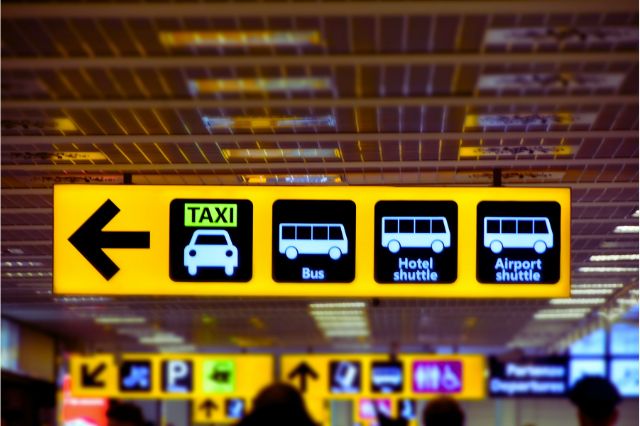Cost of living in Cyprus: What can you expect?

Cyprus has quickly become a top destination for expatriates, and it’s easy to see why. This Mediterranean gem offers a unique blend of vibrant history, stunning natural beauty, and a relaxed lifestyle that appeals to many. With its warm climate, beautiful beaches, and rich cultural heritage, the Republic provides a quality of life that’s hard to beat. Whether you’re drawn to its picturesque coastal towns or the lively urban centres, there is something for everyone.
In this guide, we’ll explore the cost of living in Cyprus, helping you understand what to expect when making the move. From housing and daily expenses to healthcare and transportation, we’ll break down the key costs so you can plan your relocation with confidence.

General Overview of Cost of Living in Cyprus
When considering moving to Cyprus, one of the most important factors to evaluate is the cost of living. The island offers a relatively affordable lifestyle compared to many other European countries, making it an attractive option for those seeking a balance between quality of life and living expenses.
Below, we’ll explore how the cost of living in Cyprus compares to other European destinations and provide an overview of what you can expect to pay for daily necessities.
Cost of Living in Cyprus vs. Other European Countries
Compared to other popular European destinations like the United Kingdom, France, or Germany: Cyprus stands out as a more affordable place to live. Housing costs, in particular, are generally lower.
Whether you’re renting or buying, you can expect to pay less for accommodation in cities like Nicosia, Limassol or Paphos compared to major cities such as Berlin, Paris or London.
Additionally, everyday expenses such as groceries, dining out and transportation tend to be more budget-friendly. Fuel prices are also lower than on the European mainland. While Cyprus may not be as inexpensive as some Eastern European countries, it offers excellent value for money, especially given its high standard of living and pleasant environment.
However, it’s worth noting that while Cyprus offers lower living expenses, some specialised goods and services may be pricier due to import costs.
These are for example:
- Electronics and Appliances: Items like laptops, smartphones, and large household appliances tend to be more expensive due to importation costs.
- Vehicles and Auto Parts: Cars and car parts are often more expensive, as they are imported and subject to higher taxes and transportation fees.
- Specialized Medical Services: While basic healthcare is often cheaper, specialised treatments that require specific equipment or expertise can be more costly. These include, for example, cosmetic surgery or fertility treatments
- International Groceries and Products: Certain imported foods and goods that are widely available and affordable in Europe may come at a higher price due to importation expenses.
Despite this, the overall financial advantages, combined with it’s high quality of life, make it an appealing alternative to living in other European countries, especially for those seeking a Mediterranean lifestyle without breaking the bank.

Prices in Cyprus: Detailed overview
Now we will take a closer look at the cost of living in Cyprus and provide you with some sample calculations.
1. Housing costs in Cyprus
When planning a move to Cyprus, understanding the housing prices is essential. Whether you’re looking to rent or buy, prices can vary significantly depending on the region. Below, we’ll explore rental and purchase prices across key areas, as well as typical utility costs. Additionally, we’ll provide sample calculations to give you a clearer picture of what to expect for a family of three.
Rental prices in different regions
The cost of renting a home in Cyprus varies depending on the location, with major cities like Nicosia and Limassol generally being more expensive than smaller towns or rural areas.
- Paphos: Popular among expats, Paphos offers some of the most affordable rental options in Cyprus. A three-bedroom apartment in the city centre can be found for €1,700 to €2,000 per month, with even lower prices in surrounding villages – round €1,350 rent per month.
- Limassol: Known for its vibrant expat community and coastal charm, Limassol is one of the most expensive areas. Rent for a three-bedroom apartment in the city centre can range from €2,000 to €2,600 per month, with slightly lower prices in suburban areas.
- Larnaca: More affordable than Nicosia and Limassol, Larnaca offers a relaxed seaside lifestyle. A three-bedroom apartment in the city centre typically is between €1,500 and €1,700 per month, while outside the centre, prices can drop to between €1,200 and €1,500.
- Nicosia: As the capital city, Nicosia tends to have higher rental prices. A three-bedroom apartment in the city centre can cost between €1,200 and €1,800 per month, while the same size apartment outside the city centre might range from €1,000 to €1,200.
(Prices as of September 2024, all information without guarantee.)
Good to know:
Due to high demand after the war in Ukraine from well-heeled Ukrainians and Russians who fled to the island to work remotely, the rental and purchase market can become more expensive in the coming years. Anyone renting in Cyprus has to renegotiate every year.
Purchase Prices for Real Estate
If you’re considering buying property, the prices also vary depending on the region.
- Paphos: Paphos offers attractive property prices, with city centre apartments costing between €2,500 and €3,000 per square metre. In less central areas, prices can drop to €1,900 to €2,200 per square metre.
- Limassol: Limassol commands some of the highest real estate prices on the entire island. In the city centre, expect to pay between €3,500 and €4,000 per square metre, while properties in suburban areas range from €2,900 to €3,200 per square metre.
- Larnaca: More affordable than Nicosia and Limassol, the price per square metre in Larnaca ranges from €2,800 to €3,100 in the city centre and €2,000 to €2,500 outside the centre.
- Nicosia: Property prices in Nicosia are relatively high, with the price per square metre for an apartment in the city centre ranging from €2,000 to €3,000. Outside the city centre, prices drop to about €1,700 to €2,500 per square metre.
By comparison, a square metre currently costs an average of €3,400 – €4,100 in Germany. In France it’s between €3,500 to €5,000.
(Prices as of September 2024, all information without guarantee.)
Utilities: Electricity, Water, Internet
In addition to rent or mortgage payments, you’ll need to account for utility costs.
On average, a family of three can expect the following monthly expenses:
- Electricity: €150 or more, depending on usage and season.
- Water: €20 to €40 (if you don’t have a private pool).
- Internet: €30 to €50 for a standard broadband package.
(Prices as of September 2024, all information without guarantee.)
Sample Calculations for a Typical Family (Father, Mother, One Child)
Let’s break down the monthly housing expenditure for a family of three living in a three-bedroom apartment in different regions:
- Paphos:
- Rent: €1,700 (city centre)
- Utilities: €220 (electricity, water, internet)
- Total Monthly Housing Cost: €1,920
- Limassol:
- Rent: €2,200 (city centre)
- Utilities: €250 (electricity, water, internet)
- Total Monthly Housing Cost: €2,450
- Larnaca:
- Rent: €1,700 (city centre)
- Utilities: €220 (electricity, water, internet)
- Total Monthly Housing Cost: €1,920
- Nicosia:
- Rent: €1,600 (city centre)
- Utilities: €250 (electricity, water, internet)
- Total Monthly Housing Cost: €1,850
These sample calculations give a clear view of how much a family can expect to spend on housing in various parts of Cyprus. While prices vary, there are generally offers a range of options to fit different budgets, making it possible to find a home that suits both your lifestyle and financial situation. The more expensive the lifestyle, the higher the prices.

2. Daily Living Expenses
Daily living expenses in Cyprus are relatively affordable, especially when compared to many other European countries. Whether you’re shopping for groceries, dining out, or picking up personal care items, you’ll find that your budget can stretch quite far on the island.
Groceries: Costs for Weekly Shopping
When it comes to grocery shopping, you have many options from large supermarkets to local markets where you can find fresh produce.
Here’s an estimate of what you might spend on a weekly shopping trip for a family of three:
- Bread (1 loaf): €1.20 to €2.00
- Milk (1 litre): €1.30 to €1.70
- Fruits (e.g., 1 kg of apples): €2.00 to €3.00
- Meat (1 kg of chicken breasts): €7.00 to €9.00
- Eggs (12-pack): €3.00 to €4.00
- Rice (1 kg): €1.50 to €2.50
- Vegetables (e.g., 1 kg of tomatoes): €2.00 to €3.50
A typical weekly grocery bill for a family of three can range between €70 and €120, depending on your preferences and where you shop.
(Prices as of September 2024, all information without guarantee.)
Dining Out and Entertainment
Dining out in Cyprus is generally affordable, with a variety of options ranging from casual tavernas to fine dining. Entertainment options, such as going to the cinema, are also reasonably priced.
- Dinner for Two at a Mid-range Restaurant: €40 to €60
- Meal at a Local Taverna: €15 to €25 per person
- Coffee at a Café: €2.50 to €4.00
- Cinema Ticket: €8 to €10 per person
These prices make dining out and enjoying leisure activities accessible without putting a significant dent in your budget.
(Prices as of September 2024, all information without guarantee.)
Personal Care and Household Items
Personal care and household items are also fairly priced in Cyprus. Whether you’re buying shampoo, toothpaste, or cleaning supplies, you’ll find a variety of options across different price ranges.
- Shampoo (400ml): €3.50 to €6.00
- Toothpaste (100ml): €2.00 to €3.50
- Laundry Detergent (3 liters): €7.00 to €10.00
- All-purpose Cleaner (1 liter): €2.50 to €4.50
For those looking for budget-friendly options, Jumbo is a popular chain in Cyprus that offers a wide range of affordable household goods, stationery, toys, and more. It’s a go-to store for many residents seeking good deals on everyday items without compromising on quality.
(Prices as of September 2024, all information without guarantee.)
3. Transportation Costs
Transportation in Cyprus is an essential consideration for anyone planning to live on the island. Whether you’re using public transport, driving your own car, or flying to and from the island, it’s important to understand the associated costs. Here’s a breakdown of what you can expect to pay for various modes of transportation.
Prices for Public Transportation and Taxi Fares
Public transportation is relatively affordable, though the network is not as extensive as in other European countries. The main form of public transport is the bus, which operates in all major cities and towns.
- Bus Fare (One-way Ticket): €1.50 to €2.00
- Monthly Bus Pass: €40 to €50
- Intercity Bus Ticket: €4.00 to €7.00 per trip, depending on the distance
(Prices as of September 2024, all information without guarantee.)
Taxis are also widely available, though they can be more expensive, especially for longer distances.
- Starting Fare for a Taxi: €7.50
- Price per Kilometer: around €2.00
- Taxi Fare from Larnaca Airport to Nicosia: Approximately €45 to €55
(Prices as of September 2024, all information without guarantee.)
Fuel Prices and Average Car Maintenance Costs
For those who prefer the convenience of driving, it’s important to consider the costs associated with owning and maintaining a car in Cyprus. Fuel prices are generally in line with the European average.
- Fuel Prices (Per Liter of Petrol): €1.60 to €1.80
- Annual Car Maintenance Costs: €300 to €600, depending on the make and model of your car
(Prices as of September 2024, all information without guarantee, petrol prices may change.)
These costs include routine services like oil changes, tire replacement, and other regular maintenance. It’s also worth noting that Cyprus has relatively low car taxes compared to other European countries, which helps keep overall expenditure manageable.
Flight Tickets: Prices for Travel Within and Outside Europe
Given Cyprus’s location as an island nation, air travel is a key mode of transportation for both short and long-haul journeys. The cost of flights can vary significantly depending on the season, destination, and how far in advance you book.
- Flights to Europe (Round-trip to Major Cities like Athens, London, or Berlin): €100 to €300, depending on the season and booking time
- Flights to Non-European Destinations (e.g., Middle East or Asia): €300 to €600, with prices varying based on distance and airline
Overall, transportation costs are reasonable, whether you’re relying on public transport, driving, or flying. While public transportation is affordable, owning a car provides greater flexibility, particularly for those living outside the main urban centres. Additionally, Cyprus’s strategic location makes it a convenient base for exploring both Europe and the surrounding regions by air.

4. Healthcare Costs
Healthcare in Cyprus is generally of high quality, offering both public and private options to residents and expatriates. Understanding the healthcare system and the associated costs is crucial for anyone planning to move to the island. Here’s an overview of what you can expect in terms of healthcare services and expenses.
Overview of the Healthcare System in Cyprus
Cyprus has a dual healthcare system consisting of public and private sectors. The public healthcare system is funded by the government and is available to all residents, including expatriates, through the General Healthcare System (GHS), known as GeSY. Public healthcare facilities offer a wide range of services at relatively low costs, but waiting times can be long for non-emergency treatments.
The private healthcare sector is well-developed, with numerous private hospitals, clinics, and medical centres across the island. Private healthcare provides quicker access to specialists and treatments, with many professionals trained in the UK, US, or other European countries. While private healthcare comes at a higher cost, it offers more flexibility and shorter waiting times compared to the public sector.
Costs for Private and Public Healthcare Services
The cost of healthcare varies depending on whether you use public or private services:
- Public Healthcare (GeSY):
- Consultation Fee: It’s free for a visit to a General Practitioner (GP).
- Specialist Visit: €6 to €11 under the GeSY system.
- Hospital Treatment: Public hospital care is heavily subsidised, with minimal out-of-pocket costs for registered patients.
- Private Healthcare:
- GP Consultation: €30 to €50 per visit.
- Specialist Consultation: €50 to €100, depending on the specialist and complexity of the visit.
- Hospital Treatment: Costs can range significantly, with minor procedures starting from €500, while major surgeries can cost several thousand euros.
Private healthcare offers more immediate access but at a higher price point, making it important to weigh the costs against the benefits.
Insurance Options and Typical Doctor Visit Fees
Many residents opt for private health insurance to cover the costs of private healthcare services, which can provide peace of mind and additional coverage beyond what GeSY offers.
- Private Health Insurance:
- Premiums: Typically range from €300 to €1,500 per year, depending on coverage, age, and health condition.
- Coverage: Can include everything from routine doctor visits to major surgeries, with varying levels of coverage for dental, vision, and specialist care.
Even without insurance, typical doctor visit fees in the private sector are manageable, though they add up quickly if you require frequent care. Having insurance helps mitigate these costs and ensures access to a wider range of services without significant out-of-pocket expenses.
In summary, healthcare is accessible and generally affordable, with the public system offering low-cost care for all residents. However, for those seeking quicker access to specialists or a broader range of services, private healthcare and insurance options provide valuable alternatives. Understanding the balance between public and private healthcare options will help you make informed decisions about your health and well-being.
5. Taxation and Bureaucratic Expenses
Understanding the taxation system and bureaucratic requirements is crucial for anyone planning to relocate or establish a business on the island. Cyprus offers a favorable tax environment, but there are specific processes and costs associated with becoming a tax resident, obtaining necessary documentation, and forming a company. Below, we’ll explore these aspects in detail.
Information on Tax Residency in Cyprus
The republic is well-known for its attractive tax regime, which has made it a popular destination for expatriates and businesses alike. To benefit from the tax advantages, it’s essential to establish tax residency.
- Cyprus Tax Residency Criteria:
- To be considered a tax resident, you must spend more than 183 days in Cyprus within a calendar year.
- Alternatively, under the “60-day rule,” you can qualify if you spend at least 60 days in Cyprus, do not reside in any other country for more than 183 days, and have significant ties to Cyprus, such as employment, ownership of a business, or property.
- Tax Rates:
- Cyprus offers low personal income tax rates, with the first €19,500 of annual income being tax-free. Higher income brackets are taxed progressively, with rates ranging from 20% to 35%.
- The corporate tax rate is a flat 12.5%, one of the lowest in the European Union. Under certain IP rules, corporation tax can be reduced to 2.5%.
Becoming a tax resident can offer significant financial benefits, particularly for those seeking a more favorable tax environment.

Obtaining the “Yellow Slip” and Other Important Documents
When moving to Cyprus, obtaining the necessary documentation is a key step in the relocation process. One of the most important documents for EU nationals is the “Yellow Slip,” which is a registration certificate proving your right to reside.
The Yellow Slip is issued by the responsible immigration authority. The process can be lengthy and time-consuming. It involves providing proof of employment or financial means, proof of residence and a valid passport or ID card.
We’ll help you so that you don’t have any problems with your registration!
In addition to the Yellow Slip, other important documents may include registering for social insurance, obtaining a Cyprus tax identification number, and, if applicable, driving license conversion. Each of these steps involves varying fees and requirements.
Assistance from RebaseCyprus
Navigating the bureaucratic processes and understanding the tax implications of living or doing business here can be complex. RebaseCyprus offers expert assistance with all aspects of relocation, from obtaining the Yellow Slip to setting up a company and ensuring compliance with local regulations. By leveraging their services, you can streamline these processes, avoid common pitfalls, and ensure that you’re fully compliant with Cyprus’s legal and tax requirements.
In summary, while there are various costs and procedures involved in becoming a tax resident, obtaining necessary documentation, and forming a company in Cyprus, the benefits of doing so can be substantial. With the right support and understanding of the local requirements, you can take full advantage of what Cyprus has to offer.
As an expat, it is advisable to get help and support from local experts. Most of the administrative work in Cyprus is in Greek, which can lead to challenges and stress if you don’t speak the language.
In everyday life, you can get by with English anywhere on the island.
Conclusion: Is Living in Cyprus Right for You?
Are you still weighing the pros and cons of living in Cyprus? As this guide has shown, Cyprus offers a unique blend of affordable living, beautiful landscapes, and a rich cultural heritage, making it an appealing destination for expatriates.
The cost of living in Cyprus is generally lower than in many other European countries, especially when it comes to housing, daily expenses, and taxation. However, some specialised goods and services can be more expensive due to import costs.
Living in Cyprus provides a relaxed Mediterranean lifestyle with a high standard of living. Whether you’re drawn to the coastal cities or the charm of smaller towns, there’s something for everyone on this beautiful island. Yet, navigating the local bureaucracy, above all when it comes to tax residency, obtaining essential documents, or setting up a company, can be challenging—especially if you’re not familiar with the Greek language.
This is where RebaseCyprus comes in. Our team of experts is here to support you through every step of your relocation process. From obtaining your Yellow Slip to navigating the complexities of tax residency and company formation, we’re committed to making your transition to Cyprus as smooth and stress-free as possible.
If you’re considering making our island your new home, don’t hesitate to get in touch with us. Let RebaseCyprus handle the details so you can focus on enjoying your new life in this Mediterranean paradise. Whether you need help with paperwork, legal requirements, or simply understanding the pros and cons of living in Cyprus, we’re here to assist you every step of the way. Contact us today to start your journey!

Cyprus relocation expert – CEO of rebasecyprus.com


